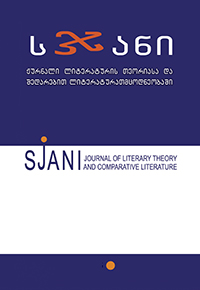Три ветви генеалогии нелинейного повествования
в современной европейской прозе
Three Branches in Genealogy of Contemporary
European Non-Linear Narratives
Author(s): Dmitri SpiridonovSubject(s): Literary Texts
Published by: ლიტერატურის ინსტიტუტის გამომცემლობა
Keywords: comparative literary studies; non-linear narratives; narratology; hypertext; fi ction, aesthetics of hypertext
Summary/Abstract: The notion of non-linear writing or non-linear narrative is now often applied to describe some special narrative strategies used to deprive the text of the linear plot. Non-linear plot means that the action has more than one eventual direction and that the reader constructs himself his own variant of plot. In some cases all possible variants are strictly determined by the author who precalculates the consequences of every reader’s choice (like in Julio Cortázar’s “Hopscotch”), in others there are no special restrictions or author’s instructions and the readers are free to choose their own way of reading (like in Milorad Pavić’s “Dictionary of the Khazars”). The present paper focuses on the sources of this kind of narrative strategies in contemporary European prose. We observe three branches in its genealogy. The first is Borges’ work and his idea of the universe as a library. Departing from Umberto Eco’s defi nition of two kinds of books – detective stories (linear reading) and encyclopedias (non-linear reading) – we argue that Borges made his own work regarding the second type of books. According to Borges, the Universe is a sort of generator producing new meanings. The source of the “unlimited semiosis” concept developed by Borges is often seen in classical philosophy, theology or even thermodynamics and theory of chaos, though it is obviously a fruit of his own experience of reading and memorizing texts. His “mind-library” becomes not an instance of conservation and reproduction but an instance of generation of new meanings. Besides philosophical legitimation of this idea in formally linear narratives (“The Garden of Forking Paths”, “Tlön, Uqbar, Orbis Tertius”, “The Library of Babel”), he also plasticized it by creating a sort of real encyclopedia (“The Book of Imaginary Beings”) which can be read in a non-linear way still being an artistic work. Opposing detective stories to encyclopedias, Umberto Eco did not take into account the non-classical variant of detective genre which represents the second source of non-linear narrative fiction. Its difference from the classical variant is that the investigator does not always find the criminal (or, speaking more generally, the truth) and the reader is coerced to make his own investigation, sometimes through re-reading the text. This variant of genre was not an invention of Borges’ (cf. Agatha Christie’s “The Murder of Roger Ackroyd”) but his work had a deep impact on its revival in Europe. The article analyzes “The Name of the Rose” by Umberto Eco and “La bibliothèque de Villers” by Benoît Peeters published the same year (1980) as being infl uenced by Borges’ “An Examination of the Work of Herbert Quain” and “Death and the Compass”. We argue that in the non-classical variant of detective genre the investigator fails because his logical method which imposes a strict order upon reality is inadequate to reality itself. Reality is wider and more complicated than any logical order.
Journal: სჯანი
- Issue Year: 2011
- Issue No: 12
- Page Range: 103-112
- Page Count: 10
- Language: Russian

